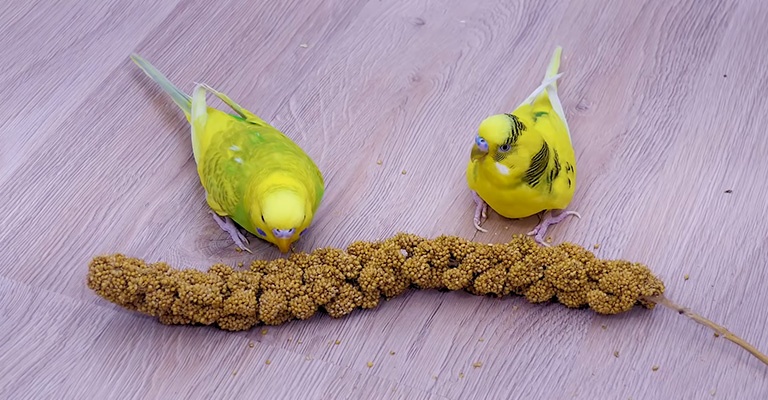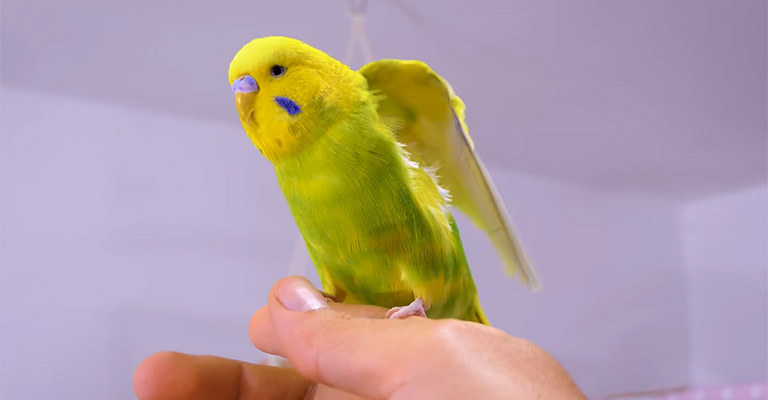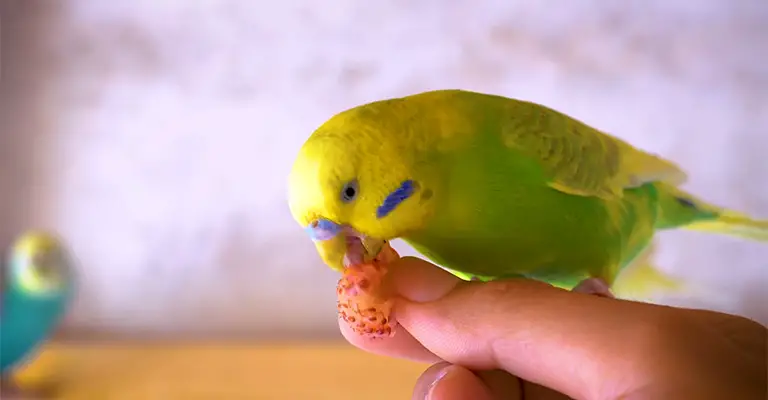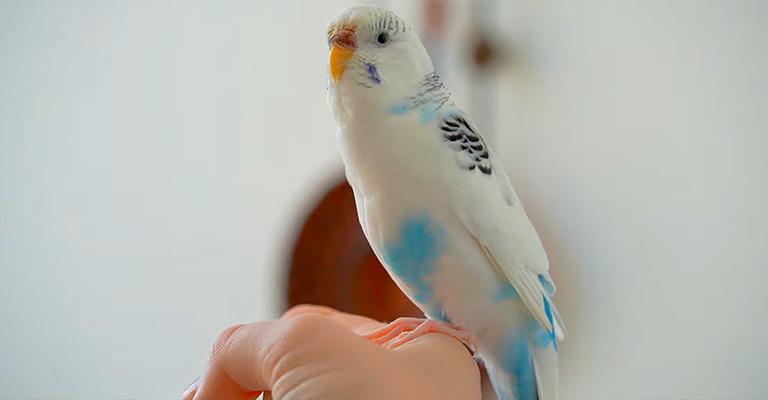The intricate behaviours of animals never cease to amaze, and budgerigars, often affectionately referred to as budgies, are no exception.
These vibrant and intelligent parrots have long captured the hearts of pet enthusiasts worldwide. One intriguing aspect of their behaviour is their innate ability to discern when to stop eating.
While these birds lack the sophisticated cognitive abilities of higher mammals, their survival instincts and evolutionary adaptations have equipped them with mechanisms to regulate their food intake.
This article delves into do budgies know when to stop eating which budgies exhibit an understanding of when to halt their consumption, highlighting the interplay between their natural instincts, social dynamics, and environmental cues.

Do Budgies Know When to Stop Eating?
Budgerigars, commonly known as budgies, are small parrots that are often kept as pets.
These birds have a natural instinct to regulate their food intake, but there are several ways in which they demonstrate an understanding of when to stop eating:
Portion Control
Budgies are adept at assessing the amount of food they need. They tend to eat smaller, frequent meals rather than gorging themselves in one go. This behaviour helps them avoid overeating.
Slow Eating
Budgies eat at a moderate pace, taking small bites and chewing their food thoroughly. This deliberate eating style allows them to better gauge their hunger levels and prevents them from overindulging.
Food Selection
In the wild, budgies have a diverse diet of seeds, fruits, and greens. When provided with a variety of food options, captive budgies tend to choose a balanced diet, instinctively avoiding excessive consumption of any one type of food.
Natural Satiety Signals

Like other animals, budgies have internal cues that signal fullness. They are sensitive to changes in their body, and when they feel satiated, they’ll naturally slow down their eating or stop altogether.
Observing Other Birds
Budgies are social creatures that often share their environment with other birds. Observing the eating habits of their companions can influence their own behaviour. If one budgie stops eating, it can serve as a cue for others to do the same.
Learning from Experience
Over time, budgies learn from their eating experiences. If they eat too much and feel uncomfortable, they are likely to adjust their behaviour in the future to avoid the same discomfort.
Environmental Factors
Budgies are sensitive to changes in their environment, including factors like light, temperature, and activity levels. These environmental cues can impact their appetite, causing them to naturally adjust their food intake.
Budgies exhibit several ways of knowing when to stop eating. These behaviours are rooted in their natural instincts, social interactions, and ability to perceive internal and external cues.
As responsible pet owners, providing a varied and balanced diet, monitoring their eating habits, and ensuring a comfortable environment will contribute to their overall health and well-being.
Why Is My Budgie Eating So Much?

There are many possible reasons why your budgie might be eating so much. Here are some of them, along with some explanations and suggestions:
A Naturally Large Appetite
Some budgies have bigger appetites than others and may tend to eat more than is necessary.
This could be due to their genetics, personality, or metabolism. If your budgie is otherwise healthy and active, you may not need to worry too much about their food intake.
However, you should still monitor their weight and body condition regularly and avoid overfeeding them with treats or fatty foods.
Lack Of Exercise
If your budgie is not getting enough physical activity, it may be using food to pass the time or cope with boredom. A sedentary lifestyle can also lead to obesity and health problems in budgies.
You should provide your budgie with a spacious cage that allows them to fly, perch, climb, and explore.
Deficiency In Diet
If your budgie is not getting enough of the nutrients they need from their diet, they may be eating more to compensate. Budgies need more than just seeds to stay healthy. Seeds are high in fat and low in protein, vitamins, and minerals.
A balanced diet for budgies should include pellets, fresh fruits and vegetables, and occasional treats. Pellets are specially formulated to provide all the nutrients that budgies need.
Fruits and vegetables are rich in antioxidants, fibre, and water. Treats such as millet sprays, honey sticks, or egg food should be given sparingly, as they are high in calories and sugar.
Seasonal Changes
Budgies are naturally adapted to eat according to the availability of food in their environment. In the wild, they eat various seeds (as they come into season), fruits, berries, and vegetation. They feed on or near the ground. What they eat varies with food availability during different seasons.
You should try to mimic these natural feeding habits by offering your budgie a variety of foods that are appropriate for their species and season.
Hormonal Changes
Budgies may experience hormonal changes due to factors such as age, sex, breeding season, or environmental cues.
Hormonal changes can affect your budgie’s appetite, mood, behaviour, and energy level. For example, female budgies may eat more when they are pregnant or laying eggs, as they need more energy and nutrients for themselves and their babies.
Stress Or Anxiety
Budgies are sensitive animals that can get stressed or anxious by various factors such as noise, temperature, lighting, predators, illness, injury, loneliness, or change of routine. Stress or anxiety can affect your budgie’s appetite in different ways.
Some budgies may eat more as a coping mechanism or a comfort behaviour. Others may eat less or stop eating altogether due to fear or depression.
Illness Or Injury
Budgies may eat more when they are sick or injured for various reasons. Some illnesses or injuries may cause pain or discomfort that makes your budgie eat more to distract themselves or soothe themselves.
Others may affect your budgie’s metabolism or digestion, making them eat more to get enough energy or nutrients.
Boredom Or Curiosity
Budgies are intelligent and curious animals that need mental stimulation and enrichment. If your budgie is bored or curious, they may eat more to explore new foods or flavours or to have something to do.
You should provide your budgie with a variety of foods that are suitable for their species and taste preferences.
Social Influence
Budgies are social animals that live in flocks in the wild. They communicate and bond with each other through various behaviours, including eating.
Budgies may eat more when they are in the company of other budgies, as they may mimic their eating habits or compete for food.
How Do I Know If My Budgie Is Hungry?

Here are some signs that your budgie may be hungry and need more food:
Opening Their Mouths
Budgies may open their mouths and stretch their necks when they are hungry, especially if they are young.
This is a way of begging for food from their parents or owners. You may notice this sign when you approach your budgie’s cage or when you offer them food.
Making Loud Noises
Budgies may make loud and persistent noises when they are hungry, such as chirping, squawking, or screeching.
They may do this to attract your attention or to communicate their hunger to other budgies. You may hear this sign when your budgie’s food bowl is empty or when they see you eating.
Actively Shaking And Moving
Budgies may shake and move their bodies when they are hungry as a way of expressing their excitement or frustration.
They may also flap their wings, bob their heads, or twitch their tails. You may see this sign when your budgie smells or sees food or when they are waiting for you to feed them.
Eating Non-Food Items
Budgies may eat non-food items when they are hungry, such as paper, wood, plastic, or metal.
They may do this to satisfy their hunger or to explore new textures and tastes. However, this can be dangerous for your budgie, as they may ingest harmful substances or choke on them.
Nibbling On Your Fingers Or Clothes
Budgies may nibble on your fingers or clothes when they are hungry as a way of showing affection or curiosity.
They may also do this to get a taste of your food or to get your attention. However, this can be annoying or painful for you, especially if your budgie bites hard.
Searching For Food In The Cage
Budgies may search for food in the cage when they are hungry, such as on the floor, in the corners, or in the toys.
They may do this to find any leftover food or crumbs that they missed before. However, this can be a sign of poor hygiene or insufficient food supply.
Losing Weight Or Feathers
Budgies may lose weight or feathers when they are hungry as a result of malnutrition or stress.
They may look thin, weak, or bald in some areas. However, this can also be a sign of illness or injury that affects their appetite or digestion.
Being Lethargic Or Depressed
Budgies may be lethargic or depressed when they are hungry, as they lack the energy and motivation to do anything.
They may sit still, sleep more, or lose interest in their toys or mates. However, this can also be a sign of boredom or anxiety that affects their mood or behaviour.
Being Aggressive Or Territorial
Budgies may be aggressive or territorial when they are hungry, as they feel threatened by other birds or humans who may take their food away.
They may bite, peck, chase, or fight with anyone who comes near their food bowl or cage.
FAQ
Budgies have a natural sense of portion control. They eat small, frequent meals and slow down their eating as they start to feel full. This helps them avoid overeating and maintain a healthy weight.
Budgies rely on various cues such as natural satiety signals, observing other birds’ eating patterns, and learning from their experiences.
They adjust their eating behaviour based on these factors to prevent excessive consumption.
Yes, budgies have an innate ability to regulate their food intake. Their diverse diet selection and deliberate eating pace contribute to their ability to avoid overeating and choose a balanced diet.
Environmental factors like light, temperature, and activity levels impact budgies’ appetite.
They are sensitive to changes in their environment, which can naturally affect their eating behaviour and help them know when to stop.
Budgies are social birds that observe and learn from each other. If one budgie stops eating, it can serve as a signal for others to stop as well.
This social interaction plays a role in helping them determine when to halt their food consumption.
Conclusion
In the captivating world of budgerigars, the question of whether they know when to cease eating unveils a realm of instinctual wisdom.
These petite parrots, with their finely tuned senses and social inclinations, exhibit an array of behaviours that reflect their ability to gauge their satiety.
From portion control and deliberate eating to observing peers and heeding internal cues, budgies showcase a symphony of responses that underscore their evolutionary adaptability.
While not endowed with human-like consciousness, these birds navigate their dietary decisions with an impressive blend of biology and learned experience.
As we marvel at their intricate instincts, we are reminded of the remarkable diversity of life’s strategies for survival, even within the feathered companions perched in our homes.